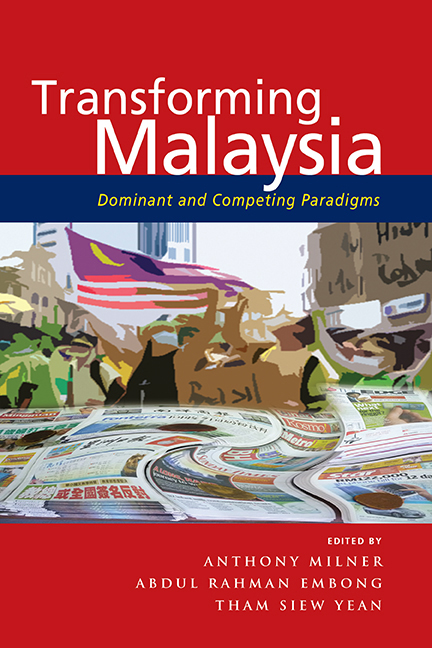Book contents
- Frontmatter
- Contents
- List of Tables and Figures
- Preface
- Acknowledgements
- List of Contributors
- 1 Introduction
- 2 Race and Its Competing Paradigms: A Historical Review
- 3 Knowledge Construction, the Rakyat Paradigm and Malaysia's Social Cohesion
- 4 Race Paradigm and Nation-Building in Malaysia
- 5 Race-Based Paradigm in Poverty Eradication and Income Distribution Analysis and Policy
- 6 Foreign Workers in Malaysia in the Post-Independence Era: Race Paradigm in State Policy, Academic Writings and Public Discourse
- 7 Trade Policy Formulation in Malaysia: Navigating between the Economic and Race Paradigms
- 8 National Security Conceptions and Foreign Policy Behaviour: Transcending the Dominant Race Paradigm?
- Index
3 - Knowledge Construction, the Rakyat Paradigm and Malaysia's Social Cohesion
Published online by Cambridge University Press: 21 October 2015
- Frontmatter
- Contents
- List of Tables and Figures
- Preface
- Acknowledgements
- List of Contributors
- 1 Introduction
- 2 Race and Its Competing Paradigms: A Historical Review
- 3 Knowledge Construction, the Rakyat Paradigm and Malaysia's Social Cohesion
- 4 Race Paradigm and Nation-Building in Malaysia
- 5 Race-Based Paradigm in Poverty Eradication and Income Distribution Analysis and Policy
- 6 Foreign Workers in Malaysia in the Post-Independence Era: Race Paradigm in State Policy, Academic Writings and Public Discourse
- 7 Trade Policy Formulation in Malaysia: Navigating between the Economic and Race Paradigms
- 8 National Security Conceptions and Foreign Policy Behaviour: Transcending the Dominant Race Paradigm?
- Index
Summary
INTRODUCTION
This chapter proposes that the rakyat paradigm is an inclusive paradigm that has the potential to break through the dominant race-based societal paradigm that has dominated Malaysian history of nation-building in the last five decades or so. This inclusive paradigm can be creatively tapped for the purpose of building and maintaining social cohesion in a diverse multiethnic society like Malaysia. To understand the progressive content of the rakyat paradigm, a historical sociology approach by examining, in particular, the history of ideas and their social forces in different periods of Malaysian society is necessary.
The chapter argues that while the concept rakyat already gained extant usage during the pre-colonial feudal era of kerajaan or the raja-centred polity in the Malay states, it did not have the racial or communal overtones because the rakyat were subjects of a ruler, irrespective of their racial or ethnic origin. Nevertheless during the feudal era, rakyat was always the subject class, subservient to the ruler, and in terms of social status, they occupied the lowest rung in the social hierarchy. When the idea of the nation and nationalism was invented during the early decades of the twentieth century in colonial Malaya — the era of “the invention of politics” as Milner (2002) puts it — the imagined nation had to reside or had to be located not only within a territory, but also and very importantly within the womb of a people. It was during this period spanning several decades before the Second World War and the subsequent post-war decade that the rakyat paradigm dramatically changed; the semantic permutation took place whereby the rakyat who was the subject class subservient to the ruler, was transformed to embody the yet to-be-born nation, the imagined community (Anderson 2006 [1983]).
With the spread and deepening of the anti-colonial movement that relied on the mobilization of the people, the notion of daulat also underwent a transformation whereby we saw the emerging notion of kedaulatan, or sovereignty — from raja's daulat to kedaulatan rakyat or sovereignty of the people in whose imagination the nation is embedded. Nevertheless, the long historically constituted symbiotic relationship between the raja and rakyat had to be addressed in a way that accommodated not only the new political awakening and democratic impulses of the people but also the institution of the kerajaan and raja itself.
- Type
- Chapter
- Information
- Transforming MalaysiaDominant and Competing Paradigms, pp. 59 - 81Publisher: ISEAS–Yusof Ishak InstitutePrint publication year: 2014



